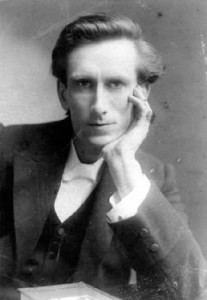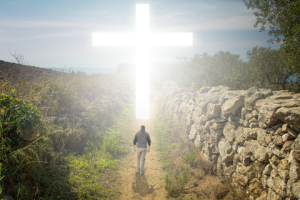I Must Have Another Drink!

If we suppress the “fundamental idea of God” that lies within us, then God gives us up to the lusts of our heart. There is war between the flesh and the spirit; we don’t do what we want to do; our lives become unmanageable. We are powerless over sin—and if that powerlessness involves mind-altering substances, alcohol or drugs becomes our god. As Paul quotes in a flurry of verses beginning at Romans 3:10: “as it is written: None is righteous, no, not one; no one understands; no one seeks for God. All have turned aside; together they have become worthless; no one does good, not even one. “All have sinned and fallen short of the glory of God.” (Romans 3:23)
Although we are powerless over sin, God has provided a way out through faith in Jesus Christ. And this righteousness is available for all who believe. In his commentary on Romans, John Murray said: “There is no discrimination among believers—the righteousness of God comes upon them all without distinction.” The Old Testament itself (the Law and the Prophets) bears witness to this. In fact, it can be shown that God had this plan for salvation in mind even before the sin of Adam and Eve.
But now the righteousness of God has been manifested apart from the law, although the Law and the Prophets bear witness to it— the righteousness of God through faith in Jesus Christ for all who believe. For there is no distinction: for all have sinned and fall short of the glory of God, and are justified by his grace as a gift, through the redemption that is in Christ Jesus, . . . (Romans 3:21-24)
The root meaning of the Greek word for redemption is to deliver by paying a price. So our deliverance from sin through Jesus Christ is more like a ransom than liberation. We were bought at a price and not simply liberated from the concentration camp of sin and death. So there is a contrast here between the freely given gift of grace and the costliness of the ransom paid by Christ to release us.
Not only have all sinned and fallen short of the glory of God, but all are justified by grace, free of charge, through the redemption in Christ Jesus. “By his grace as a gift” emphasizes the unmerited nature of God’s justification and is the solution to the conclusion of verse 3:20, namely that “by works of the law no human being will be justified.” Nothing we do, not even what we possess as creatures made in His image, can predispose God to cause us to be free from sin and in right relationship with Him. Yet He gives it freely as a gift.
. . . whom God put forward as a propitiation by his blood, to be received by faith. This was to show God’s righteousness, because in his divine forbearance he had passed over former sins. It was to show his righteousness at the present time, so that he might be just and the justifier of the one who has faith in Jesus. (Romans 3:25-26)
Here the gospel and mere recovery take different paths, because of the significance of Christ for salvation. Both the gospel and recovery can acknowledge the powerlessness we have over sin (addiction), but Paul asserts that our release from sin was at the cost of Jesus’ death as an atoning sacrifice. In mere recovery there is no redeeming sacrifice; no ransom paid for the release from addiction. Faith in God to deliver from addiction leads to a liberation from addiction, but not to the redemption that is in Christ Jesus.
This idea of a costly ransom is further asserted in referring to Christ Jesus as a propitiation in verse 25. The Greek word used here is only found one other time in Scripture, in Hebrews 9:5 where it refers to the mercy seat, the covering over the Ark of the Covenant. On the Day of Atonement, Yom Kippur in modern Jewish worship, the high priest would enter into the Holy of Holies and sprinkle the mercy seat with the blood of a sacrifice to make atonement for the sins of all the people (Leviticus 16). The sprinkling of blood over the mantle of the homes of the Israelites was also done so that the angel of death would “pass over” their homes as it brought judgment to Egypt (Ex. 12:1-20). The Passover meal celebrates this deliverance.
So Paul is presenting Jesus Christ as the redeeming sacrifice that takes away the sins of all who believe in him. Our sins are atoned for because of the blood of his sacrifice.
Paul has been unpacking several phrases in these last few verses; and he does so again in verse 3:26. The righteousness of God in verse 21 is noted to be the righteousness of God through faith in Jesus Christ in verse 22. The redemption (ransom) in Christ Jesus noted in verse 24 was specified to be a result of our willingness to believe that he was the true expiatory sacrifice (verse 25). Not only was this to show the righteousness of God because He passed over our former sins (verse 25), but that God did so at this present time, in Christ Jesus (verse 26), because there was no other way. In Jesus Christ alone do we receive forgiveness of our sins and justification from God. Jesus himself was not only righteous, but also the one who declares that all who have faith in him are righteous themselves.
Notice the similarity between the powerlessness over sin noted above and how Bill W. described the powerlessness over alcoholism faced by the alcoholic in the “Step One” essay of Twelve Steps and Twelve Traditions: “Every natural instinct cries out against the idea of personal powerlessness. It is truly awful to admit that . . . we have warped our minds into such an obsession [for destructive drinking] that only an act of Providence can remove it from us.”
In Twelve Step recovery there is a saying that once you are powerless over addiction, continued drug and alcohol use will ultimately lead to jail, institutions, or death. There is no hope for an addict or alcoholic who remains in an active addiction. Ultimately, they will die in their addiction. Some sociologists even liken addiction to indirect suicide. But sometimes, the suicidal impulse is more direct. Here is a quote from “An Inner Truth,” from the AA Grapevine:
One night, I decided that I couldn’t live with alcohol anymore–but I couldn’t live without it. So, I devised a fail-proof plan to take my life. I took a vacuum hose and connected it to the exhaust of my truck, taped and sealed the windows, started the truck, finished my fifth (I wouldn’t want to leave any behind), and prepared to die. I awakened the next morning in my truck, very sick, with an empty fifth, and very much alive. I looked at the gas gauge and there was still a quarter tank of gas left. The key was in the “on” position and the fail-proof plan had failed. The truck died during the night, and I didn’t. Somehow, a few months later, I ended up at an AA meeting sitting across the table from a man who had attempted suicide with a shotgun and blown his face off. He looked across the table at me and said, “Welcome,” and then, “Boy, you look like crap.” Coming from a man without a nose and a lot of facial damage, this statement stuck in my mind.
Proverbs 23:29-35 captures the clear cycle of unmanageability in alcoholism. It explicitly describes the spiral of progressive sin in alcoholism:
Who has woe? Who has sorrow? Who has strife? Who has complaining? Who has wounds without cause? Who has redness of eyes? Those who tarry long over wine; those who go to try mixed wine. Do not look at wine when it is red, when it sparkles in the cup and goes down smoothly. In the end it bites like a serpent and stings like an adder. Your eyes will see strange things, and your heart utter perverse things. You will be like one who lies down in the midst of the sea, like one who lies on the top of a mast. They struck me, you will say, but I was not hurt; they beat me, but I did not feel it. When shall I awake? I must have another drink.
In My Utmost for His Highest (which was used by early members of A.A), Oswald Chambers noted there is something in human nature that laughs in the face of every ideal you have. “If you refuse to agree with the fact that there is vice and self-seeking, something downright spiteful and wrong in human beings, instead of reconciling yourself to it when it strikes your life, you will compromise with it and say it is of no use to battle against it.” So it’s not just that we do wrong things—that we sin, drink or use drugs—but that there is something in human nature that is opposed to our ideals.
There is something within us that seeks to resist the good we want to do. Sinful behavior is an expression of a sinful heart (cf. Mark. 7:20-23; Proverbs. 4:23; 23:7). John Calvin said in The Institutes of the Christian Religion, “The human mind is, so to speak, a perpetual forge of idols.” We dare to imagine a god suited to our own understanding and substitute “vanity and an empty phantom” for the true God. The god whom we have thus conceived inwardly, we then attempt to embody outwardly.
Oswald Chambers said if we repeatedly run after self-serving desires, eventually they become our gods. For the addict and the alcoholic, their drugged state becomes their god. Sin in this sense is wrong being, not wrong doing. It is deliberate, emphatic independence of God:
The revelation of the Bible is not that Jesus Christ took upon Himself our fleshly sins, but that He took upon Himself the heredity of sin which no man can touch. God made His own Son to be sin that He might make the sinner a saint. All through the Bible it is revealed that Our Lord bore the sin of the world by identification, not by sympathy. He deliberately took upon His own shoulders, and bore in His own Person, the whole massed sin of the human race—“He hath made Him to be sin for us, who knew no sin,” and by so doing He put the whole human race on the basis of Redemption. Jesus Christ rehabilitated the human race; He put it back to where God designed it to be, and anyone can enter into union with God on the ground of what Our Lord has done on the Cross.
Remember that in his divine forbearance, God passes over our former sins—even those we don’t remember doing while in a blackout. This shows His righteousness, for He is the justifier of those who have faith in Jesus (Romans 3:25-26).
If you’re interested, more articles from this series can be found under the link for “The Romans Road of Recovery.” “A Common Spiritual Path” (01) and “The Romans Road of Recovery” (02) will introduce this series of articles. If you began by reading one that came from the middle or the end of the series, try reading them before reading others. Follow the numerical listing of the articles (i.e., 01, 02, etc.), if you want to read them in the order they were originally intended. This article is (06) in the series. Enjoy.





